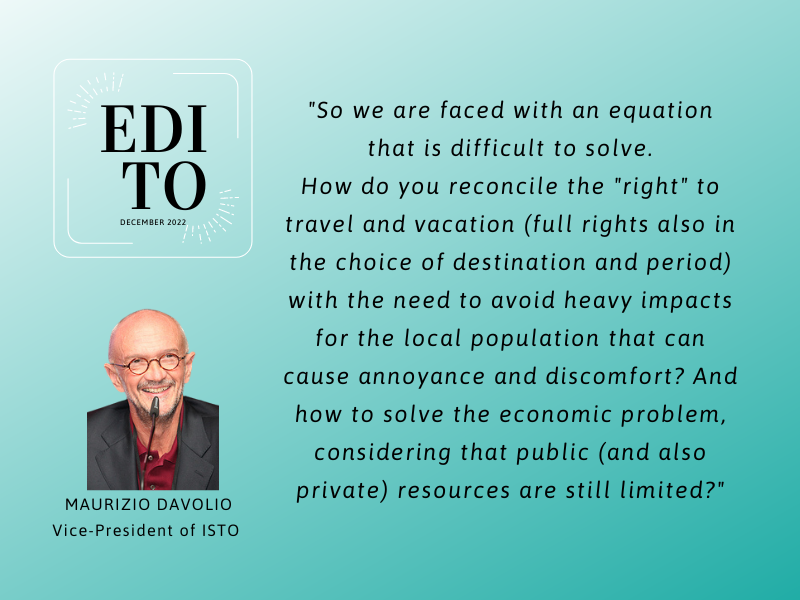How do social tourism and responsible tourism converge?
Social tourism and responsible tourism have originally different natures, missions and objectives that require explanation and deserve adequate reflection, also taking into account the fact that both these forms or modalities of tourism are organized, at an international level, within the same association, ISTO.
Social tourism has always had the aim of facilitating access to travel and holidays by all citizens, in particular those belonging to social categories with limited economic means. A goal to be achieved with forms of travel and holidays organized in groups. The experiences were and are the most varied: trade unions, cooperatives, associations, and parishes but also private companies have for decades offered travel opportunities to their associates, members, and employees. The phenomenon still persists even if on a smaller scale. Municipalities have often organized stays for their senior citizens. Some states have also promoted access to holidays, for example, the experience of the Chéques Vacance in France (ANCV) and Switzerland (REKA) is attributable more to the social policies of tourism than to social tourism in the strict sense, or the experience of Imserso in Spain, aimed at seniors.
Therefore a strong social and solidarity purpose, often presented as the concretization of a right, albeit more moral than real, so much so that for years we have been talking about "tourism for all", alluding to the overcoming of both economic, social and physical barriers.
Responsible tourism, on the other hand, places the interests, rights and expectations of the host communities at the centre. Tourists must respect the territory they visit and the culture of those who live there, that is, traditions, customs, and lifestyles. They find themselves in the house of others and must therefore adapt to the place they are visiting. Responsible tourism trips and stays are full of visits, meetings, and relationships between the local communities and their guests. The local population must derive adequate benefits from tourism, in a nutshell, it can be said that in responsible tourism the priority is given to the gain for the local communities and therefore to local suppliers or partners over economic savings for travellers.
Responsible tourism organizations have strong concerns about mass tourism and the anti-tourism and overtourism phenomena that frequently occur in several cities and locations around the world and that show the intolerance and annoyance that the local population, or at least one of its part, test for the excessive and often disordered tourist presence.
So we are faced with two very different approaches, which contradict each other. The question is whether these approaches are compatible with each other.
The picture is made even more complicated by another aspect: many social tourism initiatives, aimed at accessing holidays and travel by the less well-off categories, propose low season periods, late spring or early summer, that is the autumn for seniors and often only within the country of residence and not abroad.
In summary: we give you the opportunity to go on vacation but you have to stay in your country and go on holiday when the tourist season has not yet started or is nearing its end.
It is questionable whether this is right. Is there a series A tourism and a series B (or C) tourism?
So we are faced with an equation that is difficult to solve.
How do you reconcile the "right" to travel and vacation (full rights also in the choice of destination and period) with the need to avoid heavy impacts for the local population that can cause annoyance and discomfort? And how to solve the economic problem, considering that public (and also private) resources are still limited?
In recent years, some new phenomena concerning the purchase have contributed to the solution of the problem of access to travel: certainly, low-cost airlines have favoured travel for millions of people, making the cost of the flight economically accessible. And also the systems for booking and purchasing accommodation in houses and apartments have determined the economic accessibility of the stay, resulting in a huge increase in travellers. Forms of sharing economy have strongly favoured travel and the mobility of young people. The evolution of cruising which has become mass tourism has contributed to overcoming the economic barriers that existed at the time of the luxury cruise (which nevertheless continues to exist).
These recent phenomena have partially reduced the importance of the objective of facilitating access to travel from an economic point of view, without necessarily affecting its quality.
Furthermore, there has also been an evolution in the processes of aggregation of people for travel and stays and in forming groups; there has been a gradual shift from forms of aggregation on a territorial, trade union or corporate basis to forms based more on shared cultural or naturalistic interests, hobbies, sports practices, with a consequent ontological transformation of social tourism.
A solution that is sometimes suggested consists of the proposal of “minor” destinations, less known, in order to favour a better distribution in the territory of the tourist flows. However, it is objected that tourist flows cannot be easily regulated and governed and that freedom of choice must in any case be respected. On the other hand, if we reflect sincerely when we go to a country never previously visited, we all aim to visit the most famous and best-known places, to a Chinese or Indian tourist who comes to Italy or Europe for the first time or perhaps even for the second time we cannot offer even very valuable towns in the interior of the country and we cannot expect them to go there.
However, some actions are possible.
It is possible to operate on the large and new events that are organized, placing them intelligently in the calendar, outside the very high season. It is possible to operate on the new attractors, locating them outside the urban centres crowded with tourists. The same tourism promotion can guide the choices, with the indication of alternative destinations. Booking systems can facilitate visits, guaranteeing the date and visits of appropriate duration and not chaotic and hasty.
Other actions can help too. In the case of adoption of forms of economic incentives for travel and holidays, certain seasons can be favoured over other or even certain destinations. However, to avoid the "Series A and Series B tourism" effect, action may be taken to support the qualification of lesser-known destinations in terms of services, activities, experiences, and opportunities in order to make them more attractive and competitive.
The results of appropriate and one-way tourism policies can be very positive:
- Travel and vacation are really encouraged for everyone.
- It makes travel and vacation enjoyable and rewarding and not a second choice or fallback.
- The life of the host communities is respected and the relationship between the host and the host is improved, as the causes of discomfort and hostility have been overcome or reduced.
- In addition, the optimization in the distribution of flows over time favours the stabilization of employment relationships, a very important social objective, and the better allocation of fixed costs of operating the exercises with possible positive effects on prices.
- The enhancement of minor destinations involves a better balance in the tourist development of the territories, also in terms of induced activities.
- The impetus for new and often innovative and creative tourism entrepreneurship is encouraged in territories that have not yet been adequately developed in tourism.
These are extremely positive results, fully shared in the context of responsible tourism, particularly attentive to relations between the local community and its guests, the quality of the trip in terms of content, the development of inland areas, and the fight against overtourism.
Social tourism can make a strong contribution in this direction; the organization of travel and group stays can adapt to the aforementioned tourism policies more effectively than individual tourism, also favoured by new trends that focus more on relations with the territory and its communities than in the past.
Even religious and devotional tourism, which is part of social tourism, evolves towards conviviality, overcoming the stereotype: group by bus, visit the sacred place, basilica or monastery, Holy Mass, frugal meal, stroll with the purchase of souvenirs from far away, return, but, in a nutshell, today tends to turn to the local communities and to meet, to visit the secular cultural heritage, to taste typical products, to purchase authentic handicrafts in a framework of attention to the environment.
In conclusion, social tourism and responsible tourism, despite having different origins and objectives, can converge in the commitment to sustainable tourism that is truly and seriously offered to all, a tourism of quality, which places the human person at the centre both as a traveller and as a member of the local community.

